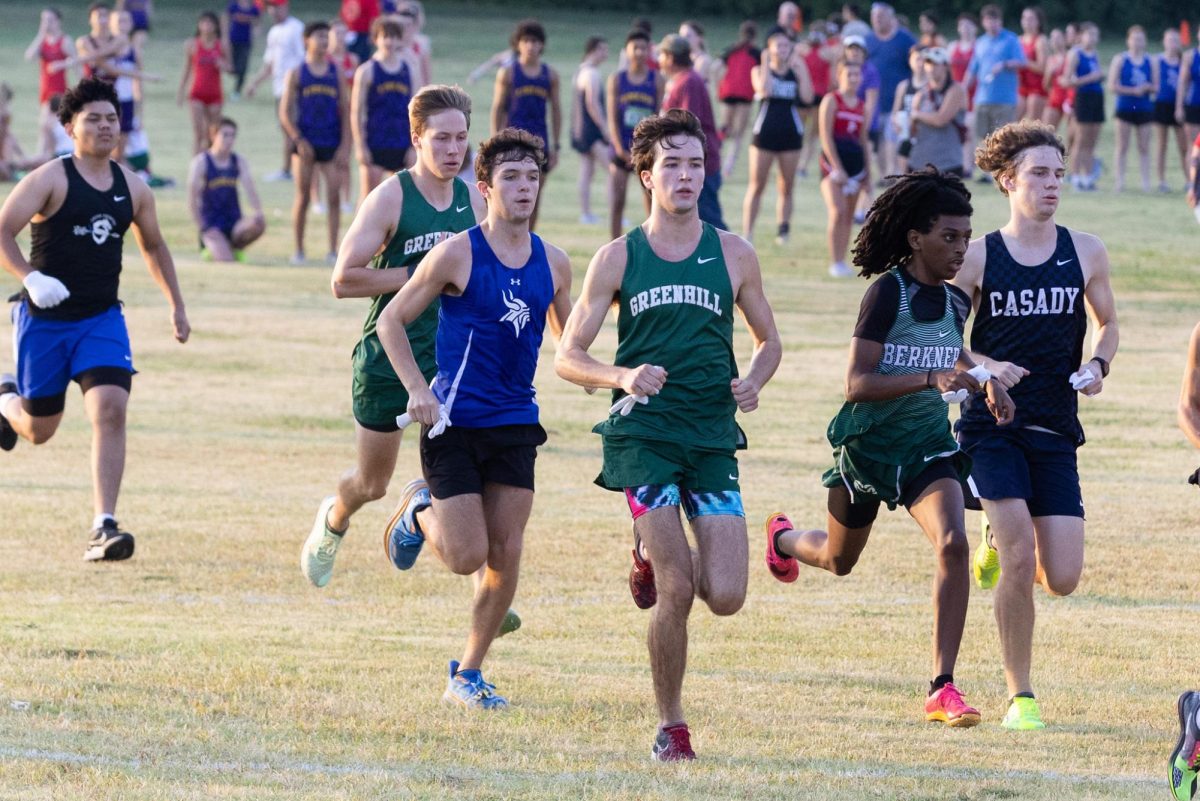Scrolling through short videos on Generation Z’s beloved social media platform, TikTok, is a large part of daily life for many Greenhill students. In the lunch line or during breaks in the day, some students are on TikTok frequently.
The thought of life without TikTok is unthinkable to some students, but Congress has voted to ban the app because of national security concerns due to Chinese ownership of its parent company, ByteDance.
On April 20, the U.S. House of Representatives voted 352-65 in support of legislation that would ban TikTok in the United States. On April 23, the Senate followed suit, and President Joe Biden signed into law the act known as Protecting Americans from Foreign Adversary Controlled Applications.
Now, ByteDance has nine months to sell TikTok to an American buyer. The president can extend the Jan. 24, 2025, deadline by 90 days if a deal is in the works at the end of the period.
The law provides for the complete ban of TikTok in the U.S., and it would allow the government to take action against app stores and impose fines and other accountability mechanisms on ByteDance if they continue distributing TikTok in the United States.
Many Greenhill students and teachers say they feel conflicted by the possibility of a TikTok ban.
“I agree that it definitely could be a privacy concern if China is able to access individuals’ data, but at the same time, I don’t think that banning TikTok would do anything to change that since there are so many other apps that are collecting your data,” said junior Aditi Vikram.
Politics
The United States has the largest TikTok consumer base in the world, with over 150 million users, almost 20% of whom are under 17.
Government officials are apprehensive about the potential for the app to potentially compromise sensitive user data and leak it to the Chinese government. This apprehension stems from Chinese legislation that enables their government to covertly acquire data from both Chinese corporations and individuals for intelligence purposes.
“What is the problem is that TikTok has no option other to respond to the needs of the Communist Party of China,” U.S. Sen. Mark Warner, a Virginia Democrat, said in an interview with NPR. “That takes primacy over return to shareholders or to customers.”
There are three main concerns that U.S. officials hope to address with a TikTok ban.
First, officials believe that TikTok’s potent algorithm could be used by the Chinese government to inject disinformation into American political races. Second, politicians fear the Chinese government might collect the personal data of U.S. citizens who use the app. Third, many worry that the Chinese government may download dangerous software onto devices across the nation.
The United States is not the first country to harbor these concerns. India banned TikTok and hundreds of other Chinese-owned apps in 2020, citing national security threats. The United Kingdom, Canada, France and Taiwan have banned TikTok for similar reasons.
The Treasury Board of Canada Secretariat describes TikTok as “presenting an unacceptable level of risk to privacy and security.”
Attempts at banning TikTok in the United States have been made before. Former President Donald Trump attempted to use his emergency powers to block the app in 2020 and President Biden banned the app on federal devices in 2023.
Furthermore, several universities, including University of Texas at Austin, Texas A&M University and University of Florida, have banned TikTok on their campuses by blocking it on their university Wi-Fi networks.
Community Opinions
With a large portion of the Greenhill student body using TikTok, the potential ban of the app has raised both campuswide alarm and support for a crackdown.
Many question how such a ban would be enforced. In countries such as China, internet access is regulated by the government. However, in the U.S., there is no such restriction.
“I think they were talking about removing it from the app store so anyone who wants to download it in the future wouldn’t be able to download it,” said Upper School History Department Chair Amanda Bresie. “However, so far as I know there is no way of deleting TikTok from every phone that already has it.”
Many students and teachers question the bill’s constitutionality. Without any public evidence of China’s exploitation of TikTok, many argue that the federal government is restricting First Amendment rights of speech and expression. This is especially true considering Congress’s attempts to force a sale of TikTok to an American company.
“There’s definitely concerns as to whether banning TikTok would be violating people’s free speech,” said Vikram. “The bill would have to provide a clear and present danger in order for the government to shut down a source of media for the people.”
For this same reason, Bresie says she disagrees with the ban, despite having unfavorable views of the app.
“I think TikTok is dumb,” said Bresie. “But I also believe in free speech, and I think it would be sort of absurd to have the government come in and as a whole ban TikTok.”
As the ban looms, many have questioned the political intentions behind the effort. Many politicians who have used TikTok as a campaign platform support the legislation, prompting charges of hypocrisy.
Sophomore Trent Hedrick views the ban as a way for politicians to further a foreign policy agenda against China.
“I think that they’re using China kind of as a fear-mongering tactic,” said Hedrick. “And I think that’s something that’s been present in American politics for a long time.”
One of the irritants in U.S.-China relations is U.S. support of Taiwan, the island-nation that became the refuge of the losing Nationalist forces in the civil war won by Mao Zedong’s Communist soldiers in 1949. China contends that Taiwan is part of its sovereign territory, while Taiwan effectively functions as an independent country on the strength of U.S. military and diplomatic support.
With the recent aid package passed in Congress for Taiwan as well as Ukraine and Israel, U.S. relations with China are strained. Many believe a TikTok ban would only worsen relations.
“I think our relationship has gotten worse and worse with China,” said Vikram. “And as we’ve seen, with the U.S. getting in between Taiwan and China, China is getting increasingly mad at us. So, there’s definitely going to be a lot more animosity in the future.”
Additionally, Hedrick says he feels the ban’s purpose is to gain publicity for politicians.
“I think it’s definitely a PR thing,” said Hedrick. “I think a lot of representatives of Congress think that it would be beneficial for their campaigns to push out TikTok since it is disliked by their older constituents.”
Prevalent Concerns
Many students and faculty members also agree that a potential ban could be harmful to small businesses because they rely on the app for advertising.
TikTok recently reported that the app was responsible for generating roughly $15 billion in 2023 revenue for 7 million small American businesses.
“I think a lot of individuals are angry, especially now, because there are people who rely on TikTok for their jobs, and there are people who rely on TikTok for advertising,” said Vikram.
Despite concerns about the intentions behind the ban, students and teachers understand the core reasoning behind the legislation.
“I agree that it definitely could be a privacy concern if China is able to access individuals’ data,” said Vikram.
A larger concern is the potential of TikTok to influence U.S. elections.
“It is very clear that Russian propaganda influenced the 2016 election,” said Bresie. “So far, reports have indicated that both Russia and China are engaging in misinformation campaigns to sway this upcoming presidential election.”
At the same time, students and teachers say the ban fails to confront the core issue of social media transmitting misinformation and radical ideas.
“I do think most social media has misinformation, not just from China, from all over the world,” said Upper School counselor Kathy Roemer. “Even American-owned social media companies are filled with misinformation. I think it divides our school sometimes over things that are in the news. It has a huge impact.”
Roemer’s concerns of misinformation aren’t limited to TikTok, however.
Junior Madi McClellan said she would just switch to another social media platform with the same concept as TikTok’s short-form videos if a ban were to take place.
“I think that if TikTok was banned, it would obviously leave a vacuum for another entertainment platform to get more popular.” said McClellan. “So, I think I would probably just go back to using Instagram Reels or whatever I used before TikTok.”
Presence of TikTok on Campus
Though a potential ban of TikTok would not likely curb social media usage, the constant chatter surrounding the app’s future has sparked discussion on how students are using the app and other social media platforms.
Many believe that TikTok is not all bad. In fact, some believe that the app can be quite informative.
“I do notice that students tell me that they found out about something because of a TikTok and then went and dug in and got more information and I think that’s awesome,” said Bresie. “One way that I see students use TikTok is finding news stories and figuring out what’s happening in the world and educating themselves on different things.”
Head of Upper School Trevor Worcester says getting information from only one source is the perfect recipe for creating echo chambers.
“If TikTok is your only source of ‘news,’ I’m a little concerned about that,” Worcester said. “I would say it’s not just TikTok, it’s I think anything where you are saying: this is my sole source of information. The silo effect that can happen regardless of your ideology, and that’s just troubling.”
Because of the way that the TikTok algorithm works, viewers are often shown videos on their feed that match the kinds of content they interact most with. If someone only interacts with content on one side of the political spectrum, in theory, they will continuously be shown content that reiterates those ideals.
Upper School history teacher Scott Cotton says it is important to teach students to mitigate the risks of misinformation on social media.
“I think that in the government class, maybe [social media] should be a unit,” said Cotton. “Overall, maybe we as a school should look at this more carefully. We try to eat healthy food in the cafeteria [and it would] probably be good for our students to have healthy media diets too.”
The idea of a media “diet” or “detox” is something that has been at the forefront of discussion in many different environments. This is because, on average, teens spend more than three hours a day on social media alone, according to the New York Times.
Worcester says that in the future he would like to have an Upper School week where phones are not allowed out for the entirety of the school day.
“I’d love to see what happens in a week,” said Worcester. “I would [love to see] what happens at lunch when you’re actually having to have a conversation.”
Many students do recognize the addictive nature of social media and how it can distract from schoolwork.
“I personally don’t use it anymore because I feel like it’s really addicting,” said Vikram. “But when I did use it, it was something that took over a lot of my day and made me really unproductive. But I still don’t think that’s a reason to ban it because people should still have the option to use it if they want it.”
This overconsumption that Vikram mentions is something that Bresie notices daily. She says that it has invaded the everyday life of students.
“I think the amount of time people spend on their phones is astonishing,” said Bresie. “I had my advisees share their screen time hours and most were between 6 to 10 hours a day.”
From disruptive trends to the psychology of how people reflect the media they consume, TikTok can have a negative influence on students.
“There’s some bad behavior that tends to get reinforced through it,” said Worcester. “I think that’s the piece that I’m more concerned about.”
As politicians and pundits debate the approaching TikTok ban, the discussion over how the popular app and other social media platforms affect the education of Greenhill students is a greater preoccupation for faculty and administrators.
“When you come across a person or a site that is put out by some sort of media, immediately open up another tab, type in that name, and see what other hits come up,” said Bresie. “We need to be teaching people how to deconstruct things deeper than face value.”



